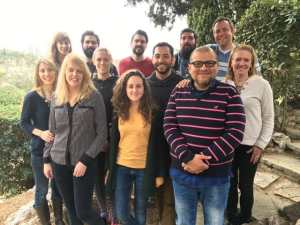How can we recruit and train more people to be involved in the Great Commission?
During the Global Leadership Conference (GLC) this past summer, the LDHR leaders identified key SHIFTS we need to make to achieve our 2020 goal of 10 million multiplying disciples.
The first two of those SHIFTS are greater spiritual dependence and a volunteer friendly perspective.
A third SHIFT is inspiring, motivating and equipping our staff for that volunteer perspective.
Related to these shifts, some of the key conversations we have had recently deal with how to support the SLM Catalytic Strategy. The LDHR Area leaders and coaches will also be discussing how to better recruit and train more people to be involved in the Great Commission during their coaching visits and monthly chats.
We lead the first experience for training and equipping in our organization. The question also comes to us:
What can we do as NST trainers and leaders
to equip our staff with a volunteer friendly perspective?
Here are some ideas we’d like you to try:
- Make adjustments for the SLM Catalytic strategy and new staff. What can you adjust in your new staff training experience to equip the new staff who come from a Catalytic background and desire to return to that type of ministry? How can the on-the-field training tasks be done in a Catalytic context?
- Consider how to adapt the training materials and expectations for use with volunteers. What virtual or short-module deliveries could be created? Which would be the most important topics to cover with volunteers? Who could do the training?
- Review the training materials and make relevant updates for new tools, resources and vocabulary that has been created in the last five years since the new training was implemented.
- Collaborate across strategies. Meet with your strategy (SLM, LeaderImpact, GCM, Althletes in Action, etc) leaders and ask for feedback regarding how to improve the training experience for the new staff they are recruiting.
What else could you do? Are there things you have already implemented that you could share with the rest of us?










在〈New Staff Training and Volunteers for the Great Commission〉中有 8 則留言
wow just seeing this post now and it is so relevant to me.
I will be involved in running NST cycle this year. we have always done it in the base campus model, but as a country we have shifted big time to catalytic and i was wondering how this will work especially for the new entrants who haven\’t been involved with cru at all. am glad to see that this has caught the global eye. i will share any insights i get and look forward to hear from other trainers as well
Lynette,
It is exciting to hear that you are shifting to a catalytic model. The training materials were designed to give that kind of flexibility – rather than to be taught/practiced in only one type of setting. I am looking forward to hearing your insights!
I think it is important to keep the vision and goal in mind. What is the outcome we want? Focus on that and not so much the \”letter\” of the training. Instead of going \”by the book\”, crossing every \”t\” and dotting every \”i\”, keep in mind the ultimate mission, the vision and who we are training; then make appropriate adjustments.
just saw a great example of flexibility in thinking about NST here in the UK – new staff (mid-career part-time) adjusting the expectations and timeline for the staff member in light of time, experience, and role.
That sounds very interesting, Andrea – I\’d love to hear more later about the specific adjustments that were made. That may help others do the same or similar in their context for mid-career and/or part time staff.
Yes, I would be interested to hear about this AND other places that are making adjustments in NST for Catalytic staff and volunteers. Anybody have any examples?
we are facing this reality here in Kenya. One couple who are seeking to \”Volunteer\” with us, we can sense the calling of God in them, their kind of Job/business does not tie them, its sort of they are their own Masters, i am grappling with the idea of how to train them where they are, with the basic training we have without necessarily uprooting them from their context, so that they can do what they are doing effectively which is ministry to couples!
Thanks for writing, Benson! I look forward to hearing how you adapt the basic training for the volunteer context! Let\’s talk more about it in Thailand! 🙂